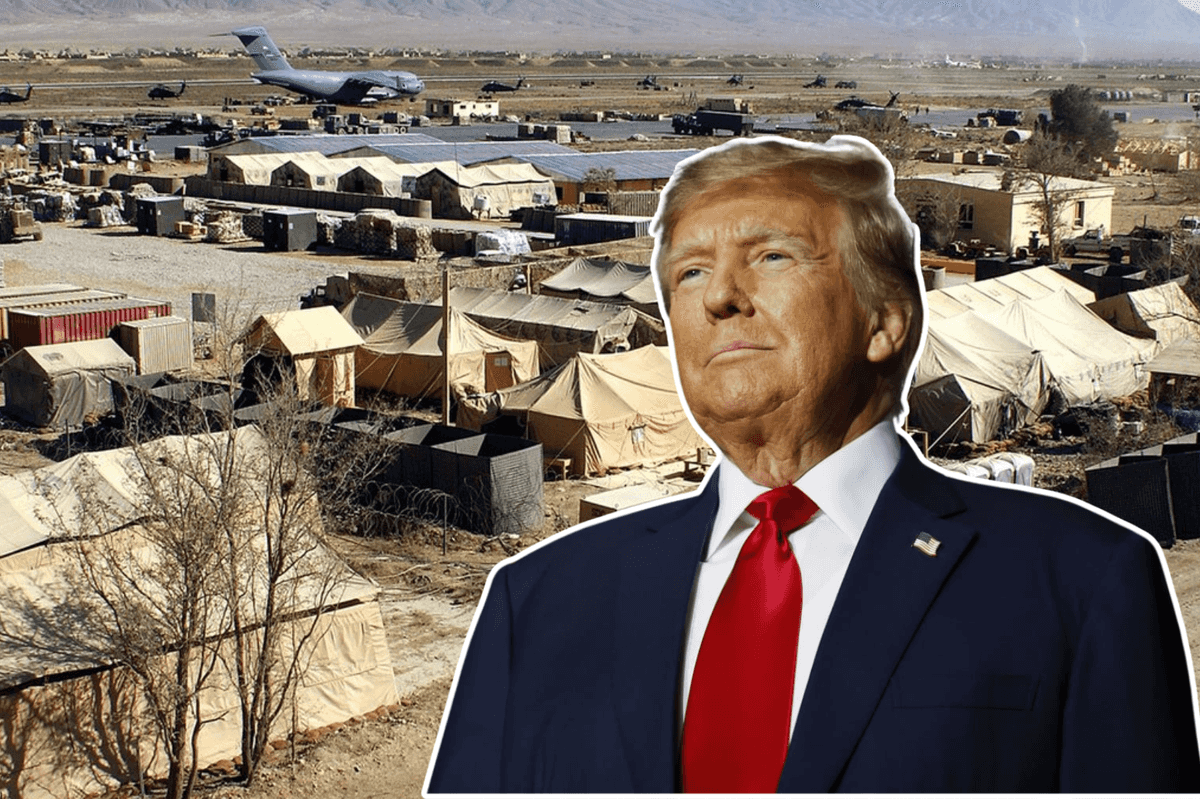Trump’s Bagram gambit: A return to Afghanistan or just a shot at China?
Experts say a US return to Bagram could spark strong public backlash in Afghanistan and alarm neighboring countries
Azhar Khan
Producer, Karachi Desk
Azhar Khan is a journalist with over 14 years of experience across print, electronic, and predominantly digital media. He has recently held key editorial roles at leading media organizations.

Trump’s remarks echo past failures and future ambitions, with the U.S. withdrawal leaving a lasting mark on Washington’s foreign policy.
Nukta
US President Donald Trump has reopened one of the most fraught chapters of recent American history, declaring that the United States should “take back” Bagram air base in Afghanistan - the sprawling military complex abandoned during the chaotic withdrawal of 2021.
Trump reporters on Friday: “We should have never given it up,” reviving a debate that many in Washington hoped was over. For Afghans, however, the idea sounds like déjà vu and for Beijing, like a provocation.
A battlefield relic, now a strategic prize
Bagram - built by the Soviets and transformed into the nerve center of America’s longest war - was once home to tens of thousands of U.S. troops.
Today it is in Taliban hands, a relic of foreign occupations past.
Mansoor Ahmad Khan, Pakistan’s former ambassador to Afghanistan, told Nukta that Bagram became the symbol of U.S. military strength during the NATO and U.S. presence in Afghanistan.
He highlighted the base’s strategic location near China, Pakistan, Iran, Central Asia and Russia, noting that without any U.S. base in Bahrain, operations in the region, such as the 2022 strike on Ayman al-Zawahiri, face logistical challenges.
Trump, however, sees it differently, viewing it not as a reminder of failure but as a potential launchpad in the next great-power contest with China.
“It’s an hour away from where they make their missiles,” Trump said, repeating his claim that Beijing has quietly established a presence at the base - a claim the Taliban strenuously deny.
In his telling, Bagram is less about Afghanistan than about American leverage in Asia.
Kabul rejects the idea
The BBC quoted a statement from Zakir Jalal, a Taliban foreign ministry official, saying that Afghanistan seeks engagement with Washington only on the basis of “mutual respect and shared interests” - not under the shadow of a U.S. garrison.
Any return of American troops, he warned, was out of the question. For the Taliban, still struggling for legitimacy, allowing U.S. forces back would risk shattering credibility at home.
- YouTube www.youtube.com
Khan further noted that a U.S. return to Bagram would provoke strong public reaction in Afghanistan and could alarm neighboring powers, including China, Pakistan, Iran, Central Asian countries, and Russia.
He added that foreign military presence in Afghanistan historically complicates Pakistan-Afghanistan relations, exacerbates trust deficits, and can fuel militancy along the border, as seen during both the Soviet invasion and the Taliban insurgency against U.S./NATO forces.
Beijing weighs in
Beijing, eager to strengthen its influence in the region, issued its own warning. China’s state-run Global Times quoted foreign ministry spokesperson Lin Jian saying, “Afghanistan’s future should be decided by its own people,” and cautioned against “stoking tensions and creating confrontation.”
China has courted the Taliban diplomatically and economically, presenting itself as a stabilizing alternative to the West.
Senior journalist Shamim Shahid told Nukta that Bagram’s strategic importance is rooted in its historical role during major conflicts.
“Following 9/11, allied forces targeted Bagram, which contributed to the fall of the Taliban government,” he explained. Shahid added that a physical U.S. return to South Asia would likely strengthen American interests, reinforce its regional supremacy, and signal a perceived anti-China posture.
He further noted that the shifting dynamics between the U.S., Afghanistan, and Pakistan could increase security risks for Pakistan.
“The Doha Agreement was primarily between the U.S. and the Taliban, with Pakistan consulted but sidelined in several areas. Now, the Taliban operate independently. If the U.S. returns to Afghanistan, it could pose heightened security threats for Pakistan,” Shahid said.
The ghosts of 2021
Trump’s remarks are as much about the past as the future. The withdrawal of U.S. forces - begun under his administration and concluded under Joe Biden - remains a scar on Washington’s foreign policy record.
Thirteen U.S. troops and more than 170 Afghans were killed in a bombing during the final days at Kabul airport. Biden has blamed Trump’s 2020 deal with the Taliban for tying his hands; Trump blames Biden for bungling the exit.
A serious proposal or campaign rhetoric?
So far, there is no sign of any formal U.S. plan to retake the base. Washington’s engagement with the Taliban remains limited, focused on discrete matters such as the release of detained Americans.
By casting Bagram as an asset squandered and urgently needed, he signals that America’s story in Afghanistan may not be finished. For Afghans, who endured two decades of foreign troops, the suggestion of a return feels like history threatening to repeat itself.
For Beijing, it hints at Washington’s willingness to drag Afghanistan into its rivalry with China. And for Trump, it provides a new rallying cry - a symbol of lost power that, in his telling, only he can restore.







Comments
See what people are discussing